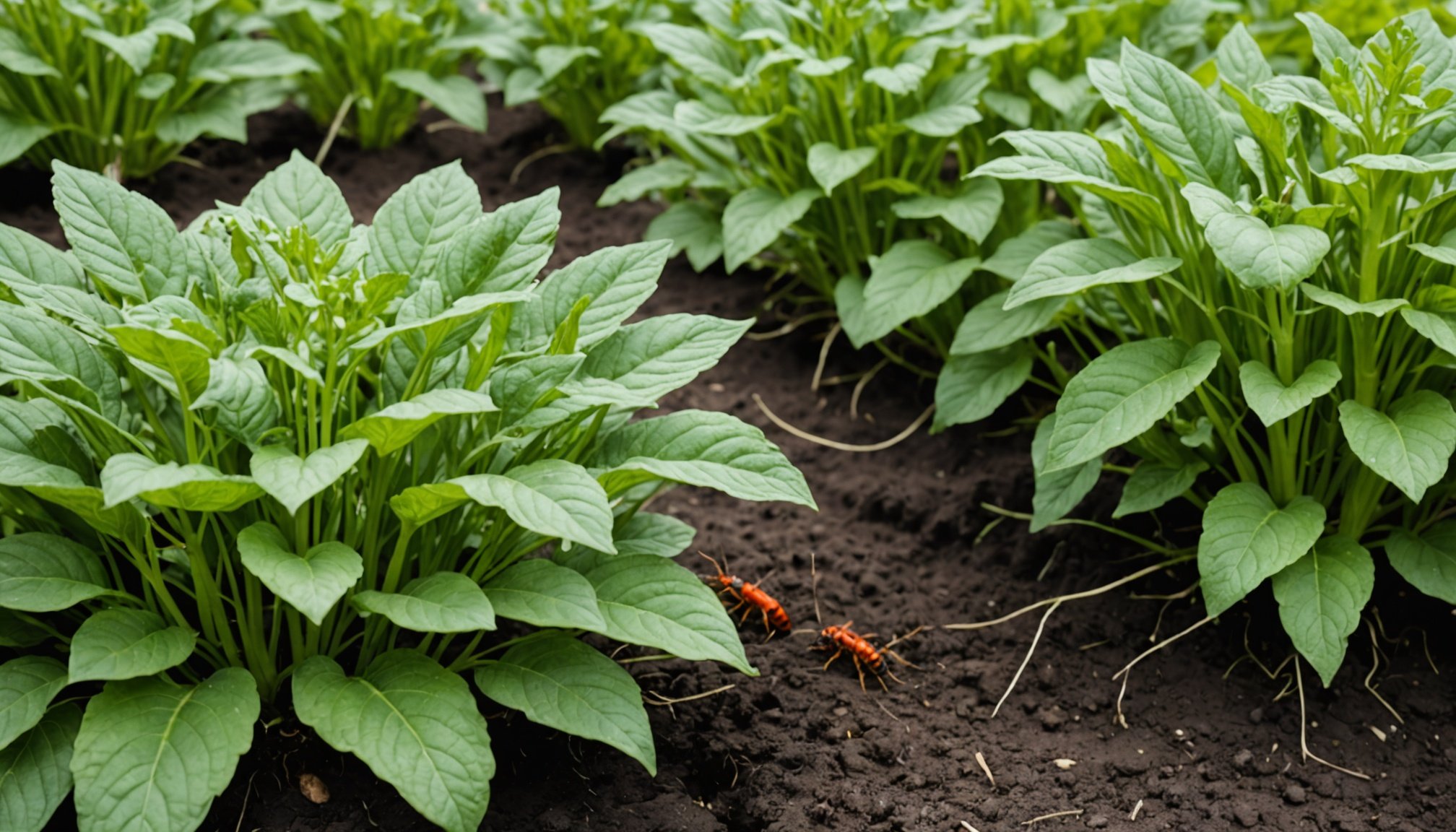Understanding Organic Pest Management
Organic pest management involves using natural and sustainable methods to control pests, foregoing synthetic chemicals. This approach is crucial for maintaining a healthier environment in sustainable gardening. It supports soil health and benefits local biodiversity. Additionally, these techniques bolster the long-term productivity of your vegetable garden.
The benefits of adopting these sustainable practices are vast. Organic pest management reduces the risk of chemical residues on produce, encouraging safer food consumption. Furthermore, it mitigates the effects of chemical run-offs on nearby ecosystems, highlighting the ecological advantages of these practices.
Also to read : Key considerations for successfully establishing a boutique vineyard in the uk
Common garden pests, such as aphids and slugs, are detractors in vegetable gardens. These pests can significantly impact plant health by damaging leaves and roots, affecting growth. Understanding their behaviour and employing organic solutions like neem oil or diatomaceous earth can help in pest control methods without harming beneficial insects.
Incorporating organic pest management strategies not only promotes a more ecological gardening approach but also empowers gardeners to make informed, responsible decisions for their gardens. Transitioning to organic methods marks a commitment to healthier produce and the environment.
Have you seen this : Mastering lavender cultivation and harvesting in the uk: essential tips for thriving success
Identification of Common Pests in the UK
Identifying common garden pests is a crucial step in mitigating damage to vegetable gardens in the UK. Some prevalent nuisances include aphids, slugs, and whiteflies. These pests thrive in varying conditions, often dependent on the season. For instance, aphids appear during warmer, dryer months, while slugs are more active in moist conditions often found in spring and autumn.
Pest monitoring can aid in effective management by keeping gardeners alert to pest presence before infestations grow. Regular inspections can help spot signs of potential problems, such as chewed leaves or gnarled roots. Utilizing known pest identification techniques enhances gardeners’ abilities to distinguish between harmful insects and beneficial ones.
Understanding seasonal patterns is also beneficial; different pests emerge at certain times of the year. Keeping a diary or using technology for tracking can support better pest monitoring efforts. By being proactive and identifying common garden pests, UK gardeners can preserve their plants and maintain thriving vegetable gardens. This vigilance pays off in healthier plants and more bountiful harvests.
Companion Planting Techniques
Companion planting brings multiple benefits, acting as pest deterrents while enhancing plant growth. This gardening method involves arranging plants to support each other, promoting a natural balance. Certain plant combinations can repel harmful insects and attract beneficial ones, offering a chemical-free pest management strategy.
For instance, planting marigolds next to tomatoes can deter nematodes, while dill attracts hoverflies, which prey on aphids. Such specific plant combinations can significantly reduce pest problems in gardens. This practical approach not only protects plants but also encourages biodiversity.
A case study exemplifying successful companion planting in UK gardens demonstrates its efficacy. A garden in Sussex utilised basil with tomatoes, leading to enhanced yield and reduced pest issues. The basil’s aroma masked tomato scent, confusing pests. Moreover, this strategy improved pollination, illustrating how companion planting can increase overall garden productivity.
Incorporating these techniques requires understanding plant relationships and experimenting with different pairings. By adopting companion planting, gardeners can promote healthier growth and create a thriving garden ecosystem. This method showcases how simple, natural arrangements can lead to large benefits in sustainable gardening practices.
Encouraging Natural Predators
In the world of natural pest control, beneficial insects play a pivotal role. These predators, such as ladybirds and lacewings, help manage pest populations by feeding on aphids and other problematic garden dwellers. Attracting such beneficial insects is an effective way to maintain a balanced ecosystem and reduce pest-related issues.
To draw these natural allies to your garden, consider incorporating diverse plant species that provide nectar and pollen. Flowers like yarrow and cosmos are particularly enticing to helpful bugs. Additionally, maintaining small water sources can support these insects, offering them a reliable habitat.
Strategies for attracting these natural predators include avoiding the use of pesticides that could harm them. By fostering a welcoming environment, these insects will naturally keep the pest population in check. Creating a mosaic of plantings that mimic natural habitats encourages them to take up residence, effectively transforming your garden into a haven.
Balancing an ecosystem with natural pest control requires commitment but offers sustainable pest management benefits. By cultivating a garden rich with beneficial insects, gardeners can enjoy a flourishing landscape without relying on synthetic solutions, ultimately contributing to a healthier environment.
Success Stories and Expert Recommendations
Learning from gardening success stories and expert insights can inspire more effective organic pest management. In the UK, many gardeners have achieved notable results by tailoring techniques to their unique environments. For instance, a gardener in Kent implemented a mixed approach combining companion planting with beneficial insects, resulting in a significant reduction in aphid infestations. This case demonstrates the value of integrating diverse strategies for maximum impact.
Expert advice highlights the importance of understanding seasonal patterns in pest behaviour. Horticulturists suggest aligning garden planting schedules with pest emergence cycles to mitigate risks. Effective pest monitoring is emphasised, as consistent observation allows for timely interventions before infestations escalate.
Here are some practical tips from experienced gardeners and horticulturists:
- Rotate crops annually to disrupt pest life cycles.
- Employ mulch to deter weeds and reduce habitat for pests.
- Use eco-friendly treatments, like neem oil, sparingly to support natural enemies.
By applying such strategies, gardeners can cultivate vibrant and resilient gardens. These real-world gardening success stories underscore the practicality of tested methods and offer a clear path to environmental sustainability.
Organic Solutions and Products
Exploring organic pest control products opens up myriad options for maintaining a healthy garden environment without resorting to chemicals. These solutions, available widely in the UK, promise safety and effectiveness in managing common garden threats.
For those interested in DIY approaches, products like neem oil and insecticidal soap offer non-toxic solutions suitable for domestic use. These substances break the lifecycle of pests such as aphids and spider mites without jeopardising beneficial insects. Making your own remedies can be equally rewarding; concoctions made from garlic or chilli pepper are simple to prepare and can effectively target bothersome pests.
When considering commercial products, look for eco-friendly treatments that align with specific pest control needs. Brands specialising in organic formulations address issues from microbial diseases to insect infestations. Such products provide targeted action while ensuring the surrounding ecosystem remains unharmed.
As you select methods and treatments, it is vital to recognise that integrating these organic pest control products with other strategic practices leads to sustainable gardening success. Always check for certification to ensure genuine organic status, thereby making informed choices that support both your garden’s productivity and ecological balance.
Seasonal Pest Management Strategies
Adjusting pest management techniques to align with seasons is key to effective control. In the UK, this means understanding pest cycles during different months. For example, pests like aphids flourish in warmer seasons, whereas slugs thrive in moist, cooler conditions like spring and autumn. Knowing these seasonal patterns helps gardeners anticipate and tackle potential infestations before they escalate.
Proactive management is essential; implementing strategies before pest numbers rise can save crops. Early intervention might involve planting pest-resistant varieties or employing physical barriers like nets to shield vulnerable plants. Such actions are especially vital during known high-risk seasons.
To align pest management with seasonal gardening, consider structuring your planting schedule around predicted pest outbreaks. This might involve sowing certain crops earlier or later to avoid peak pest activity. Timing gardening practices effectively requires careful planning and can significantly bolster your garden’s resilience against common pest issues.
Incorporating these seasonal gardening tips within your strategy maximises the success of organic pest control efforts, fostering a more robust and vibrant garden year-round. Enthusiastic and informed planning leads to thriving vegetable gardens and healthier produce.

